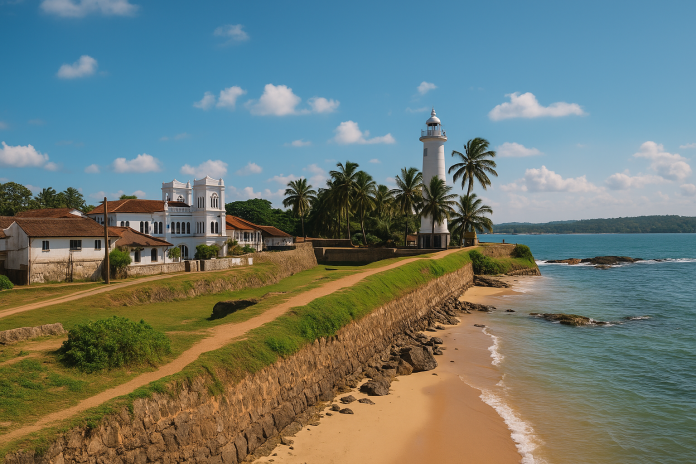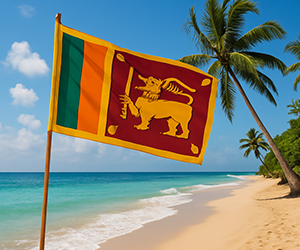Introduction to Galle Fort
Set along the sun-kissed southern coast of Sri Lanka, Galle Fort stands as a majestic reminder of the island’s colonial past and maritime legacy. Designated as a UNESCO World Heritage Site, this fortified city within the city of Galle blends Dutch, Portuguese, and British influences with Sri Lankan heritage, all enclosed within centuries-old stone ramparts.
With its cobblestone streets, charming cafés, boutique shops, historic churches, and stunning ocean views, Galle Fort is more than a tourist attraction—it’s a living, breathing neighborhood with a soul of its own.
This detailed, SEO-optimized article explores everything you need to know about Galle Fort—from its rich history and architectural marvels to top attractions, cultural experiences, shopping, dining, and travel tips.
Historical Background
Originally built by the Portuguese in 1588, the fort was later expanded and fortified by the Dutch in the 17th century, making it one of the best-preserved sea forts in Asia. The British took over in 1796, adding their own touches to the colonial infrastructure.
Despite the test of time—including wars, invasions, and the 2004 tsunami—Galle Fort has retained its authenticity, preserving its legacy as a melting pot of cultures, architecture, and religions.
Why Visit Galle Fort?
- Historic colonial architecture and landmarks
- Charming streets lined with art galleries and cafés
- Stunning sunsets from the ramparts
- Boutique shopping and artisanal crafts
- Museums and churches that reveal centuries of history
- Cultural festivals and coastal scenery
Galle Fort offers a unique blend of heritage, leisure, and discovery all in one walkable space.
Top Attractions Inside Galle Fort
1. Galle Lighthouse
One of the most photographed landmarks in the fort, the Galle Lighthouse dates back to 1939 and offers sweeping views of the Indian Ocean and the southern coastline.
2. The Ramparts
Walk along the thick stone ramparts for an unforgettable view of the sea, the town’s red-tiled rooftops, and daily local life. It’s the perfect place for sunset.
3. Dutch Reformed Church (Groote Kerk)
Built in 1755, this historic church features beautiful woodwork, an old organ, and Dutch tombstones—a fascinating look into colonial spirituality.
4. National Maritime Museum
Located in a former Dutch warehouse, the museum showcases shipwreck artifacts, traditional fishing tools, and marine biodiversity.
5. Old Dutch Hospital
Now transformed into a shopping and dining precinct, this colonial structure offers restaurants, bars, and fashion boutiques with ocean views.
6. All Saints’ Church
This Anglican church built by the British in 1871 is known for its stained glass windows and Gothic design.
7. Clock Tower and Flag Rock Bastion
These fortifications offer amazing photo ops and panoramic views of the coastline. Locals sometimes dive into the sea from Flag Rock—watch but don’t try!
8. Historical Mansion Museum
A privately owned treasure trove of colonial-era artifacts, antiques, and curiosities.
Exploring the Fort: What to Do
- Take a guided walking tour to understand the fort’s layered history
- Browse art galleries and speak with local artists
- Photograph colonial buildings and architecture
- Sip Ceylon tea at a garden café
- Relax with a spa treatment or Ayurvedic massage
- Attend a street performance or local art exhibition
Shopping in Galle Fort
Galle Fort is known for boutique shopping with a focus on quality over quantity. Items to buy include:
- Gemstones and jewelry
- Handloom fabrics and batiks
- Ceylon teas and spices
- Antique maps and books
- Locally crafted souvenirs and home décor
Top shops include:
- Barefoot Galle
- Orchid House
- Laksana Jewellers
- Stick No Bills (for vintage posters)
Dining in Galle Fort
The fort’s culinary scene is as rich as its history. Popular eateries include:
- The Fort Printers – Upscale fusion cuisine in a colonial setting
- Chambers Restaurant – Middle Eastern and local flavors
- The Heritage Café & Bistro – Ideal for brunch and coffee
- Elita Restaurant – Known for seafood and ambiance
- Poonie’s Kitchen – Great for health-conscious meals
Many restaurants offer rooftop seating or courtyard gardens, perfect for a romantic or relaxing meal.
Best Time to Visit Galle Fort
- November to April: Dry season, ideal for sightseeing, festivals, and beach time
- May to October: Rainy season, quieter and more peaceful with lush greenery
Sunset is the best time to walk the ramparts and enjoy the sea breeze.
Getting There
- By train: Scenic train ride from Colombo to Galle takes 2.5 hours
- By car/taxi: Approx. 2 hours via the Southern Expressway
- By bus: Frequent buses from Colombo and major southern cities
Galle Fort is just a short tuk-tuk ride from the Galle Railway Station.
Accommodations in Galle Fort
- Luxury: Amangalla, The Fort Bazaar
- Boutique: Mango House, Fortaleza, The Bartizan
- Mid-range: Galle Fort Hotel, Fort Bliss
- Budget: Pedlar’s Inn Hostel, The Bungalow Galle Fort
Most places are restored colonial mansions offering a blend of old-world charm and modern comfort.
Festivals and Events
- Galle Literary Festival (usually in January): A world-class event that brings together authors, poets, and readers from around the globe
- Independence Day Celebrations
- Art exhibitions and pop-up craft fairs
Responsible Tourism Tips
- Respect local customs and dress modestly in religious sites
- Avoid littering—help preserve the UNESCO site
- Support local artisans and family-run businesses
- Don’t climb on restricted fort walls
Conclusion
Galle Fort is a captivating blend of history, culture, art, and sea views. With its colonial charm, vibrant streets, and rich legacy, it offers a travel experience that is as enriching as it is relaxing.
Whether you’re exploring ancient churches, sipping tea on a cobblestone lane, or watching the sun dip below the ocean from a centuries-old wall, Galle Fort invites you to step back in time while enjoying modern comforts.
Add Galle Fort to your Sri Lankan itinerary and immerse yourself in one of the most remarkable destinations on the island.




